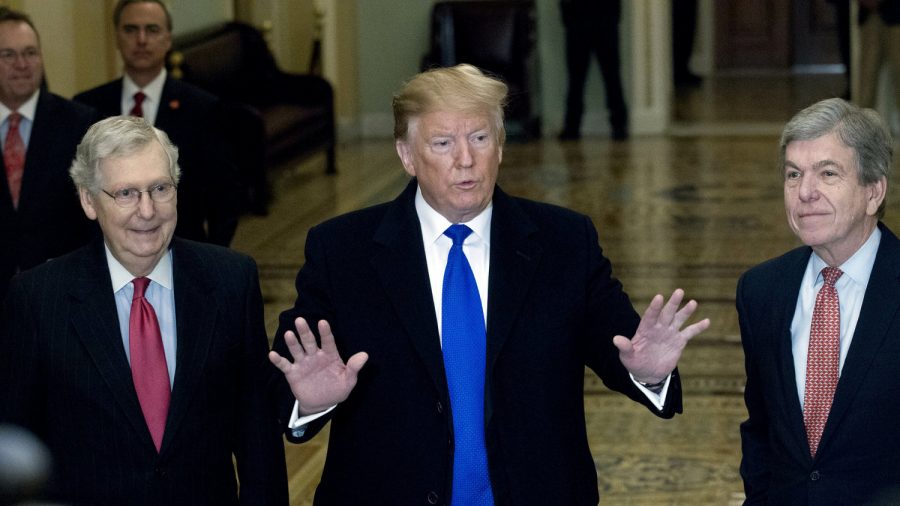WASHINGTON—Exasperated Republicans failed April 2 in their effort to short-circuit Democrats’ unprecedented obstruction of confirmation of President Donald Trump’s executive and judicial branch nominees.
A motion to move to a final vote on Senate Resolution 50 to change the upper chamber’s procedural rules on nominations was defeated 51 to 48, nine votes short of the 60 required for passage.
The resolution’s failure now means Senate Majority Leader Mitch McConnell (R-Ky.) must decide whether to use the so-called “nuclear option” later this week in order to speed up the confirmation process of two Trump judicial nominees.
Under that option, McConnell will file a point of order against the expected ruling of the Senate’s presiding officer that 60 votes are required to end debate on nominees under the cloture rule.
When the rule is appealed, only 51 votes are required to overturn the presiding officer and end debate, thus establishing a new precedent ending the 60-vote requirement. The defeated proposed rule change would have cut debate time on most presidential nominations from 30 hours to a maximum of two hours.
The measure was introduced earlier this year by Sen. James Lankford (R-Okla.), after Democrats forced extended debate 128 times on Trump nominees that could only be ended with cloture votes.
A cloture vote to limit debate must be supported by at least 60 senators, which is extremely difficult when the GOP has only 53 members. That means at least seven minority party members must agree with the majority.
Even then, debate is allowed to continue for another 30 hours after which a final confirmation vote must be scheduled. It’s not unusual, though, for several more days to elapse before the process is finally completed.
Many of the 128 nominees delayed by Democrats were ultimately approved with few or no opposition votes, a fact Republicans said proved the tactics were strictly political and not based on legitimate concerns about the officials named by Trump.
“These are individuals that have already gone through vetting at the White House,” Lankford told the Senate during the debate before the vote.
“They have already gone through FBI checks, they’ve already come to the committee, they’ve done full vetting at the staff level, then a full hearing at the member level, then answered questions for the record, passed out of the committee, had a lapse of time, then the majority vote set up to be able to move them,” Lankford said.
Just before the vote on the resolution, McConnell described the Democratic opposition in blunt terms, pointing to “the historic 128 cloture votes on nominations we had to hold on nominations in this administration’s first two years.
“That is comprehensive, across-the-board heel-dragging like nothing this body has seen before. It’s more than five times—five times—as many cloture votes on nominations as in the comparative periods for Presidents Carter, Reagan, Bush, Clinton, Bush, and Obama combined.
“In other words, systematic obstruction. Not targeted, thoughtful opposition to a few marquee nominations or rare circumstances. But a grinding, across-the-board effort to delay and obstruct the people this president puts up. Even if they have unquestionable qualifications. Even if the job is relatively low-profile.
“As I said last week, I’m sure every presidential election this side of George Washington has left some senators unhappy with the outcome. But never before, to my knowledge, has the unhappy group so comprehensively tried to stop a new president from assembling the basics of an administration.”
Former Senate Judiciary Committee Chairman Patrick Leahy (D-Vt.) defended his partisan colleagues’ delaying tactics as necessary and described Lankford’s proposal as “a resolution in search of a problem. It is an erosion of the Senate’s responsibility — our sworn constitutional duty—to advise and consent to the president’s nominations.”
Leahy added that passage of the Lankford proposal would be “removal of one of the last guardrails for quality and bipartisanship in our nominations process. It is a short-sighted, partisan power grab.”
All of the Senate’s Democrats except Kamala Harris (D-Calif.), who was absent, and both independents voted against Lankford’s proposal.
Sen. Mike Lee (R-Utah) voted with the Democrats because, he told The Epoch Times, “the Senate’s rules protect the rights of the American people by balancing the competing interests of majorities, minorities, and individual senators. They facilitate the compromise and accountability that are essential to the governing of a large, diverse nation.
“At this unusually divided moment in our history, Americans need the Senate to serve its deliberative function in our constitutional system.
“I oppose changing the post-cloture time rule. I certainly oppose breaking the rules of the Senate to do so. The current rules can work for the American people; they simply require us to do the same.”
Lankford’s proposal is similar to another one that was adopted by Senate Democrats with Republican agreement in 2013 as a temporary measure under then-Senate Majority Leader Harry Reid (D-Nev.).
McConnell was Senate minority leader at the time. The Reid-McConnell deal allowed quicker confirmation of President Barack Obama’s nominations.
“My Republican colleagues and I joined with Democrats in 2013 and supported the same sort of modest changes to our nominations process through the same sort of standing order. Were we overjoyed that President Obama had won re-election? No, but we still thought he deserved to stand up a government,” McConnell said before the April 2 vote.
From The Epoch Times

